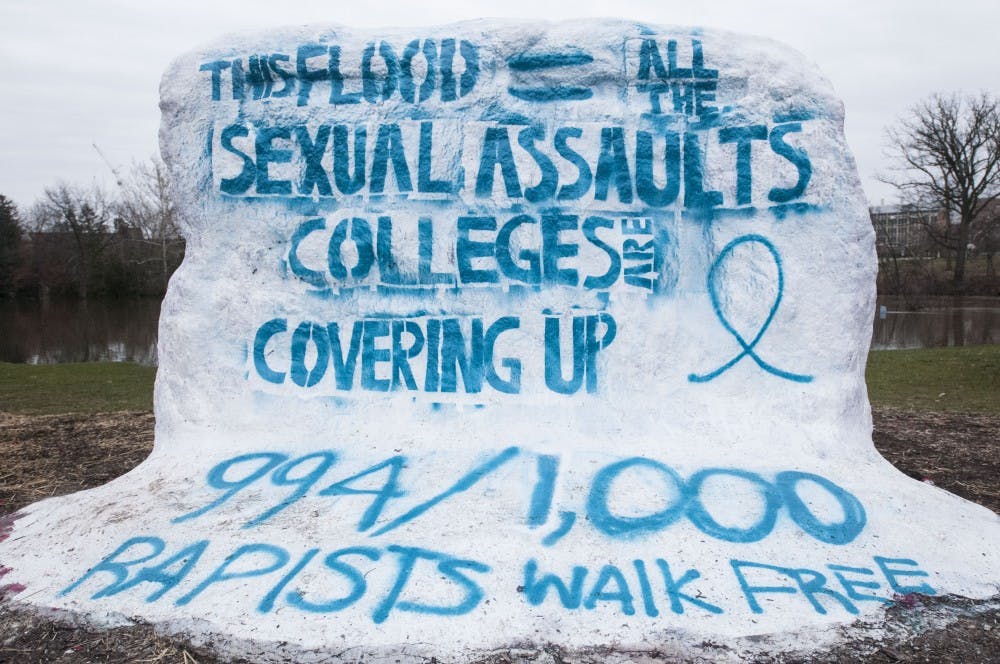The second phase of law firm Husch Blackwell’s review of MSU’s Title IX program found MSU is not successful in implementing some of its prevention programs, leading the MSU community to be unaware of resources and services available.
A “preliminary draft” of the second phase of the review, which was published early at MSU’s request, reported there are “misunderstandings” and “misinformation” about MSU’s policies, procedures and the role of MSU’s Office of Institutional Equity, or OIE, among the MSU community.
According to the report, the review was initially scheduled to be released by the end of the spring semester, but MSU requested to have a draft published early to “inform reforms that are already underway.” The final draft will be released later in the spring.
The first phase of the review was conducted and completed in November 2017. That report found MSU’s Title IX policies are compliant with the federal legal requirements, but that MSU’s mandatory reporting procedure and streamlining policies are in need of improvement.
“We concluded that the revised policy and procedures reflect a strong and genuine institutional commitment to combating sexual misconduct and creating a safe campus environment, as well as complying with Title IX’s legal requirements,” the first phase of the review reads. “MSU’s policies and procedures are among the most comprehensive and robust we have seen.”
The second phase of the review was aimed at evaluating “the effectiveness of MSU’s Title IX-related education and prevention programs and its support services” and other outreach efforts.
The second phase of the review relied on an extensive review of materials provided by MSU and by input from members of the MSU community who participated in discussion sessions in fall 2017 and winter 2018.
According to feedback from the MSU community in the report, participants often said sexual misconduct can’t be solved through training and prevention programs, but a “culture change” and “broader solutions” are needed.
The report said some people within the MSU community had a “general familiarity” with MSU’s awareness campaigns, outreach and engagement efforts, but are not fully aware of Title IX-related resources and services available to them.
“Participants expressed confusion regarding the role and leadership structure of the Office of Institutional Equity — responsible for carrying out MSU’s Title IX functions — as well as the role and responsibilities of other senior administrators who help support MSU’s Title IX efforts,” the report reads.
Community members who participated in the discussions expressed concerns with MSU’s training programs. Many said these programs are perceived to be a “check-the-box” exercise to only satisfy MSU’s compliance requirements.
“Participants represented that they believe many within the MSU community strongly desire more sophisticated, real-world, scenario-based, in-person educational and prevention programming,” the report reads. “There is also sentiment amongst participants that students, staff, and faculty alike are distracted, unengaged, and inattentive to online trainings.”
The report also addressed concerns from students, faculty and staff about MSU’s Counseling and Psychiatric Services. Among the main concerns were understaffing and being unable to keep up with an increased demand for mental health referrals.
“Among participants, there was nearly unanimous concern that understaffing results in wait times for new clients between 4-8 weeks,” the report reads. “This reported delay is not in line with participants’ expectations that such services should be accessible with little to no wait time.”
The report mentions that, overall, participants suggested “an effective communication plan” should be one of MSU’s highest priorities.
Those conducting the review found they had noticed a shift on campus after ex-MSU and USA Gymnastics doctor Larry Nassar’s sentencing, and students, staff and faculty were “clamoring” for more information about sexual misconduct prevention.
According to the report, “While this perceived shift may not have occurred for every MSU community member, many participants expressed the heightened level of interest and engagement from this tragedy is an opportunity for MSU to now lead its own movement in this area."
Support student media!
Please consider donating to The State News and help fund the future of journalism.
Discussion
Share and discuss “Title IX independent review says community "misinformed" about programs” on social media.







